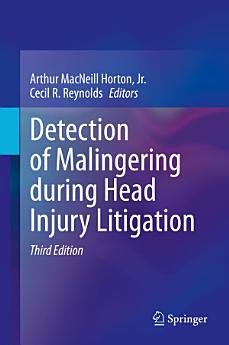Detection of Malingering during Head Injury Litigation: Edition 3
About this ebook
As in its earlier editions, this practical revision demonstrates how to combine clinical expertise, carefully-gathered data, and the use of actuarial models as well as common sense in making sound evaluations and reducing ambiguous results. The book navigates the reader through the many caveats that come with the job, beginning with the scenario that an individual may be malingering despite having an actual brain injury. Among the updated features:
- Specific chapters on malingering on the Word Memory Test (WMT), Test of Malingered Memory (TOMM) MMPI-2, MMPI-RF and MMPI-3;
- Detailed information regarding performance on performance validity tests in the domain of executive functioning and memory, Guidelines for explaining performance and symptom validity testing to the trier of fact;
- Chapters on mild TBI in children in head injury litigation, cultural concerns and ethical issues in the context of head injury litigation.
About the author
Arthur MacNeill Horton, Jr., received his Ed.D. Degree from the University of Virginia in 1976. He also holds Diplomates in both Clinical Psychology and Behavioral Psychology from the American Board of Professional Psychology (ABPP) and in Neuropsychology from the American Board of Professional Neuropsychology (ABN). Dr. Horton is the author/editor of 17 books, 47 book chapters, and over 130 journal articles. He is a past-president of ABN, the National Academy of Neuropsychology (NAN), and the Maryland Psychological Association (MPA). In addition, Dr. Horton was a member of the State of Maryland Board of Examiners of Psychologists for two four year terms.
Previously, Dr. Horton was a Program Officer with the National Institute of Drug Abuse (NIDA) of the National Institutes of Health (NIH) with responsibilities for neuropsychology and child development. He has taught at the University of Virginia, The Citadel, The West Virginia University, The Johns Hopkins University, The University of Baltimore, Loyola College in Maryland, The Department of Psychiatry of the University of Maryland Medical School and the Fielding Institute Graduate Program in Neuropsychology. Currently, Dr. Horton is in independent practice as Chief of the Neuropsychology Section at Psych Associates of Maryland in Towson, Columbia and Bethesda, Maryland.
Cecil R. Reynolds, PhD, ABPN, earned his Doctoral Degree from the University of Georgia in 1978 under the tutelage of Dr. Alan S. Kaufman, with a major in School Psychology and minors in Statistics and in Clinical Neuropsychology. He served an internship divided between the Medical College of Georgia (Pediatric Neurology section and Neurological Surgery section) and the Rutland Center for Severely Emotional Disturbed Children. Prior to joining the Texas A & M University faculty in 1981, Dr. Reynolds was a faculty member at the University of Nebraska-Lincoln, where he served as Associate Directorand Acting Director of the Buros Institute of Mental Measurement, after writing the grants and proposals to move the Institute to Nebraska following the death of its founder, Oscar Buros.He is the author of more than 300 scholarly publications and author or editor of 39 books, as well as several widely used tests of personality and behavior. He maintained a clinical practice treating trauma victims and individuals with traumatic brain injury for 25 years before retiring from clinical work at the end of 2003.Dr. Reynolds holds a Diplomate in Clinical Neuropsychology from the American Board of Professional Neuropsychology, of which he is also a past president, and had a Diplomate in School Psychology of the American Board of Professional Psychology, prior to retiring his Diplomate in 2004. He is a past president of the National Academy of Neuropsychology, APA Division 5 (Evaluation, Measurement, and Statistics); APA Division 40 (Clinical Neuropsychology); and APA Div. 16 (School Psychology). He is a Fellow of APA Divisions 1, 5, 15, 16, 40, and 53.





